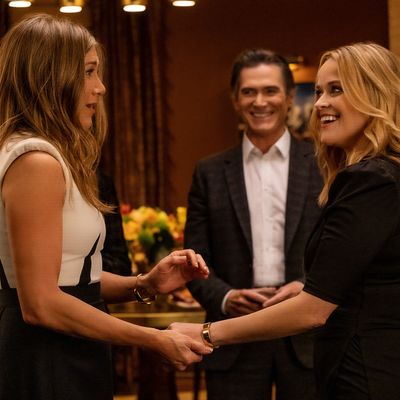
The idea of communicating what it feels like to watch the second season of the Apple TV+ series The Morning Show is absurd on its face. Sure, a rote summary is technically accurate: It’s a show about the production of a major network’s morning news series, starring two anchors played by Reese Witherspoon and Jennifer Aniston, and focusing largely on what happens after former anchor Mitch Kessler (Steve Carrell) is forced out in a Matt Lauer–esque cloud of disgrace. In the second season, the rivalry between Aniston’s Alex Levy and Witherspoon’s Bradley Jackson develops further, and network executives continue to reel from the fallout of Mitch’s departure. Julianna Margulies also joins the cast as Laura Peterson, a journalist doing a substantial investigative feature on the problems at the network.
All of that will be a part of what viewers of The Morning Show’s second season, which premieres its first episode today, will watch. But none of that touches the actual experience of watching this season of The Morning Show, which takes that fairly straightforward description and refracts it into a shimmering production of some of the silliest, most awkwardly melodramatic TV around. It is captivating in its stilted strangeness; almost arresting in its capacity to identify the least recognizably human direction for any story to go and then head unerringly toward it. “Bad” isn’t the right word, because it doesn’t capture how hilarious and striking the show can be. “Good” isn’t a great fit, either.
One element of the show’s first season that felt central to its outlook is that it is a show about news and politics that loves to squeeze itself right up against the biggest, most exciting stories it can find. In season one that was Me Too, and the Las Vegas shooting massacre, and wildfires in California. Season two’s obvious targets are COVID, the 2020 election, and Black Lives Matter. To a significant extent, this season follows the first’s playbook: The show is about those things, but The Morning Show’s attempts to tell stories about them, and the characters themselves, reach for a numb, unprincipled emptiness. Alex and Bradley fight about the presidential debate, but only as a platform for their rivalry. Who will moderate it? What will the optics be? There’s ongoing fallout about Alex and Mitch and their behind-the-scenes relationships, but The Morning Show is invested in it only as a subject that shapes public opinion. How does all of this look? Who comes off well? How will this affect the show’s ratings?
It’s not that there’s anything wrong with unprincipled emptiness, per se, especially as fodder for a workplace melodrama about people who cover the news. It’s that The Morning Show can’t fully commit to that as its guiding worldview. Characters like Bradley and Mitch (who is still on this show, for reasons it struggles to justify) veer into musings about goodness and truth, about the challenges of honesty and being vulnerable. The Morning Show treats these sequences as meaningful. The action stops, the music swells. It’s even more pronounced in the running story about the dissatisfaction of Black employees at The Morning Show, as Daniel (Desean Terry) grows more frustrated with the network sidelining him and producer Mia (Karen Pittman) struggles to keep him on the show. The camera lingers on their faces, and the implication is that this should be moving. When that scene is done, though, everything about it disappears instantly, obliterated by the show’s bigger priorities: gravely serious conversations about optics, Billy Crudup frantically drumming up subscribers for a new streaming service, shoehorning in a queer relationship in an attempt to make one of the lead characters more interesting, and, incredibly, playing a game of narrative footsie with a looming global pandemic.
It would be easier to ignore the politics of The Morning Show if The Morning Show ever let the subject drop, if it would just lean into its identity as a show about glossy jerks happily betraying one another in order to secure dominance. It could be about brutal battles behind the scenes of the chipper, brightly lit morning-show family, full stop. But the show can’t stop swerving into moments of high sentiment. There’s a father who insists on pursuing a lawsuit against the network because it’s The Right Thing to Do. Bradley’s brother, Hal (Joe Tippett), shows up to rail about childhood trauma and the oppression of growing up in an emotionally abusive and culturally conservative family. I will not spoil the season’s gay relationship, but it develops into a plot about prejudice and being outed and long-held grudges. The show wants to want to be a show about caring. What it’s good at, though, is being a show about wealthy people yelling at each other and scrolling through their Twitter feeds while glancing darkly at the looming threat of diminishing market shares.
All of that fails to capture the reality that this season of The Morning Show is just plain weird. Characters make choices that make no sense whatsoever, and they do it with a regularity that’s half the show’s appeal. It’s like a medieval illustration of an elephant drawn by an artist who’s never seen an elephant before. Do humans act … like this? Would this be a reasonable thing for a disgraced TV anchor to do? The rough outline might be close-ish, but the details are wild. An Italian documentarian character named Paola (Valeria Golino) looks approximately like a free-thinking kooky lady, unafraid of power and unbowed by social niceties. But her specific actions in almost every scene are utterly bananas. (At one point she forces a character who only speaks English to sit and watch her Italian-language documentary, while she narrates everything that’s happening. Everyone involved seems to think this is normal and an effective way to give feedback.) There is a midseason scene involving a Simon & Garfunkel needle drop that is so outlandish, it’s instantly hysterical. By the finale, characters are making choices that defy all recognizable human impulses.
And yet, by the time the season gets going and all the bizarre twists start to kick in, it would be wrong to deny there’s an appeal. An inaccurate medieval illustration of an elephant is still charming, after all. Or at the very least, entertaining. Or, at the very very least, it elicits a response, even if that response is “how on Earth did this happen?” The Morning Show tries to dodge and bury its central ideology under feints and gambits and sudden localized bouts of righteousness, but it does have a viewpoint, which is that it’s good for people to pay attention to you. Whatever else it may be doing, the second season of The Morning Show gives you plenty to watch.





